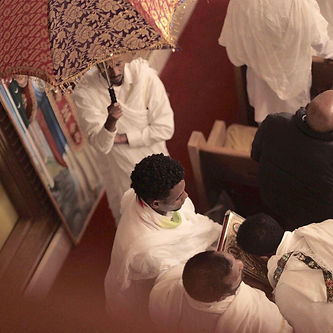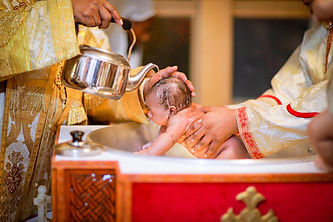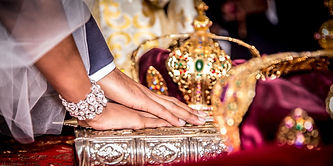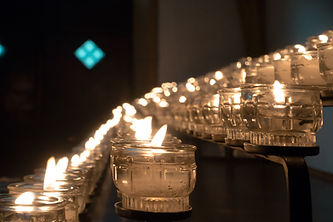
OUR SERVICES
Divine Liturgy
“Jesus took the bread, blessed and broke it, and gave thanks and gave it to the disciples and said, ‘Take, eat; this is My body.’ Then He took the cup, and gave thanks, and gave it to them, saying, ‘Drink from it, all of you. For this is My blood of the new covenant, which is shed for many for the remission of sins.”
Matthew 26:26-29
The word "Liturgy" in Greek means "a public service undertaken on behalf of the people.”It comes from: "Liaw" meaning "people", and "Ergia" meaning "work". The Ethiopian Orthodox Tewahedo Church has used this term since apostolic age and is in essence the true communion with Christ. The Divine Liturgy is a sacrificial prayer our church practice through which we acknowledge our nature, realize our message and attain our existence which is life and growth in Jesus Christ. Our church celebrates this holy mystery of Christ from His incarnation until the day of Pentecost and the expectation of His coming again. When we partake in the Divine Liturgy we remember the events and stories in the life of Jesus Christ, and make them as real to us as they were to those who first experienced them. We bring past events into the now. The Divine Liturgy is not a historical look at past events, but the way the church invites us to enter and experience our Lord Jesus Christ who continues to be present and active in the events of our lives in the here and now. Divine Liturgy begins at 6:30am-9:00am every Sunday.


Confession
"If we confess our sins, He is faithful and just to forgive us our sins and to cleanse us from all unrighteousness"
1 John 1:9
The Sacrament of Confession is a holy sacrament within the Ethiopian Orthodox Tewahedo Church by which we return to God, confessing our sins before the priest to be absolved by the priest through the authority granted to him by God. By this absolution, we are granted the forgiveness of our sins which we confessed. Confession means admiring and declaring a certain matter. The sacrament of confession means verbal confession before the priest of sins and mistakes we have committed, and confessing and humbly repenting, in order for us to be granted the absolution and forgiveness. Our Lord Jesus Christ founded the sacrament of confession when He said to His disciples: "Assuredly, I say to you, whatever you bind on earth will be bound in heaven, and whatever you loose on earth, will be loosed in heaven"(Matthew 18:18). Also after the resurrection the Lord said: "As the Father sent me, I also send you. And when He said this He breathed on them, and said to them, receive the Holy Spirit. If you forgive the sins of any, they are forgiven, if you retain the sins of any they are retained"(John 20:21-23). By this He gave priest authority of binding sins or loosing them, through the authority given to them by the Holy Spirt, and according to the remorsefulness of our hearts.
True repentance has four conditions:
- Contrite heart and remorse for previous sins.
- Steadfast intention to improve.
- Strong faith in Christ and hope in His love to forgive.
- Verbal Confession of sins before a priest.
Confession is available every Wednesday and Saturday evening.
Baptism
“So in Christ Jesus you are all children of God through faith, for all of you who were baptized into Christ have clothed yourselves with Christ”.
Galatians 3:26-27
Baptism is a Holy Sacrament by which we are born again by being immersed in water three times in the name of the Holy Trinity; the Father, the Son and the Holy Spirit. The sacrament of Baptism has the first rank among the Holy Sacraments, as it is the door by which we believers enter the church and have the right to partake in the rest of the sacraments. The best time for Baptism is Sunday before Divine Liturgy. The wisdom of granting the Sacrament of Baptism right before the Divine Liturgy, is so that the baptized person and his/her parents may attend the Divine Liturgy and receive the Eucharist. Considering that the Sacrament of Baptism is granted only once to the believer in life, by the priest, it is necessary for us to speak as accurately as possible in regards to how the practice is performed.
First we shall speak about the Absolution of the Woman, the one who gave birth to the child and presenting her child before the Lord for Baptism.
Secondly, we shall speak about the prayers of Renouncing of Satan and confessing Christ and reciting the Apostolic Creed. Then, we shall speak about the Liturgy of Baptism.
Finally, we shall explain the Rite of Baptism, then the discharge of the Baptismal water.
The practice of the Sacrament of Baptism:
- Women’s Absolution
- Renouncing Satan
- Liturgy of Baptism
- Baptism and water Discharge
Baptism would begin 6:00am before Divine Liturgy on Sunday’s.


Holy Matrimony
“So then, they are no longer two but one flesh. Therefore what God has joined together, let not man separate.”
Matthew 19:6
Marriage is a Holy Sacrament in the Ethiopian Orthodox Tewahedo Church because in it the Holy Spirit unites the two into one. In the Sacrament of Marriage, a man and a woman are given the possibility to become one spirit and one flesh in a way which no human love can provide by itself. Through the church’s formal recognition of the couple’s unity, and its incorporation into the Body of Christ, it becomes the created image of the divine love of God which is eternal, unique, indivisible and unending. Therefore this marriage is expected to count even when a couple is faced with difficult circumstances. The practice of the marriage ceremony is filled with deep spiritual meaning to remind us of the importance of this unity before God and our responsibility toward keeping this unity while being spiritually fruitful.
Memorial Service
Our Church places great emphasis on public prayers for those who have fallen asleep in the Lord. If you desire to have a Memorial Service for a departed loved one, please notify the church office well ahead of time. As a general rule, Memorial services are offered for those departed Orthodox Christians whose funerals took place in the Orthodox Church. Memorial Services are held after Divine Liturgy based on the following guidelines:
At three, nine, forty days after death on the nearest Sunday.
- At the six-month anniversary of the death on the nearest Sunday.
- At the first-year anniversary of the death on the nearest Sunday.
- At the third-year anniversary of the death on the nearest Sunday.
- At the fifth-year anniversary of the death on the nearest Sunday.
- At the tenth-year anniversary of the death on the nearest Sunday.
Memorial services are NOT held on all holy days of the Lord, such as, Christmas, Epiphany, Easter, etc.

